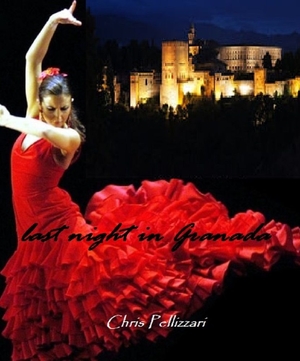Our physical place in the world defines so much of our mindset, and the longing to be elsewhere can be toxic, addictive and impossible to ignore. The main character in Chris Pellizzari’s new novel, Last Night in Granada, understands this desire for a far-flung home, a refuge of love and peace away from the mad bustle of cold water flats and the harsh streets of Chicago.
In this surreal exploration of one man’s desperation and adoration for his old life in Spain, despite his exile, the author delves into the obsession of possible salvation, and escape. Along the way, readers are welcomed into a brutal and beautiful portrait of Chicago, a hard-edged city so different from Spain’s romance and sweat and the culinary delights envisioned by the author.
With the subject of the narration swinging from procedural daytime wanders through the Midwestern city to fanciful dreams and literary musings about Lorca, death, Picasso and lost love, this book is a rollercoaster of emotion. It can be difficult to draw a clear line between memory, nostalgia, dreams, and reality, but Pellizzari has created a captivating inner world for his central character, couched within a vivid external one.
Capturing the sensation of long-term discontent, without delving into the realms of depression, can be a challenge for many authors, but Pellizzari dances well on that knife’s edge. A similar balance is struck between life and fantasy; the narrator can’t be classified as unreliable, but the ethereal nature of his thoughts, and the tangential style of the storytelling, hints that he may not be completely aligned with reality.
Depending on the setting or the type of scene, Pellizzari isn’t afraid to change his writing style, which helps define different parts of the plot. There are terse, abrupt and even fragmented sentences, like the snatches from a dream, as well as more narrative passages that show the author’s ability to pluck a clear scene from his mind. Some sections read more like streams of poetry, peppered with rhetorical questions and mystery.
While a vacillating style can occasionally feel disjointed or unpolished, there is confidence in Pellizzari’s writing, complemented by a sense of loneliness that pulls at the heartstrings and elicits immediate empathy. Pellizzari’s prose is crisp and the descriptions are beautifully done, lacing philosophy and architecture with psychology and artistic allusions.
The novel also succeeds as work of travel fiction. The minute details of Malaga and Granada imbue this book with authenticity and cultural relevance; the whole story feels like an homage or a prayer to a very sacred place. For a reader who is unfamiliar with the wonders of old world Spain, this book is a time machine and a teleportation device, so readers should not be surprised when their own wanderlust is piqued by the time they reach the final pages.
A tale of longing and city life, Last Night in Granada is a book for anyone who has ever felt the sense of distance from where they belong, as there is a great sense of catharsis in watching someone else tread that same challenging road.
Book Links
STAR RATING
Design
Content
Editing
Get an Editorial Review | Get Amazon Sales & Reviews | Get Edited | Get Beta Readers | Enter the SPR Book Awards | Other Marketing Services
























Leave A Comment